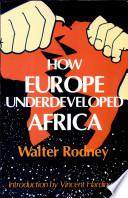“Fascism is a deformity of capitalism.”
Source: How Europe Underdeveloped Africa (1972), p. 310.
Context: Fascism is a deformity of capitalism. It heightens the imperialist tendency towards domination which is inherent in capitalism, and it safeguards the principle of private property. At the same time, fascism immeasurably strengthens the institutional racism already bred by capitalism, whether it be against Jews (as in Hitler’s case) or against African peoples (as in the ideology of Portugal’s Salazar and the leaders of South Africa). Fascism reverses the political gains of the bourgeois democratic system such as free elections, equality before the law, parliaments; and it also extolls authoritarianism and the reactionary union of the church with the state. In Portugal and Spain, it was the Catholic church—in South Africa, it was the Dutch Reformed church.
